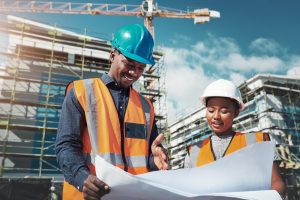CONSTRUCTION MAFIAS IN SOUTH AFRICA: CONTAIN THE TERROR BEFORE IT SPREADS
by Thandeka Nene-Matlou
‘Local business forums’ turn mafia
At the wake of 2015, a surge of organized criminality, masquerading as “local business forums”[1], disrupted the South African construction industry. What emerged was to be known as the “construction mafias” – usually consisting of local community members who claim to represent the interests of the unemployed and the marginalized. These mafias infiltrate, and demand a share in, large scale construction projects, often resorting to intimidation, vandalism, arson, theft, and violence. Construction mafias have been causing delays, losses, and risks to the safety and quality of construction projects in South Africa, affecting various sectors such as housing, infrastructure, energy, and mining.
No change in sight
No change appears to be in sight for the industry, which has endured over 8 years of disruption and agony from these groups. Indeed, it has been reported that “[i]n 2019, at least 183 infrastructure and construction projects worth more that R63 billion were affected by these disruptions across the country”[2]. The full extent of the economic damage to date, however, remains unclear.
Although the private sector has not been spared, construction mafias mainly prey on government construction sites in South Africa, demanding a stake in projects or money, sometimes as much as 30% of the contract value.[3] If their demands are not met, these groups resort to threats and violence towards owners and/or contractors, interrupting and sabotaging the implementation of projects. Others have gone as far as systematically extorting contractors for “protection fees”.
Construction mafias demand to know the contract price and have shown a willingness to hold members of state-owned entities and contractors hostage at gunpoint, if their demands are not met. This has caused severe disruptions and delays in many public infrastructure projects across the country, especially in Kwa-Zulu Natal[4] where service delivery has been affected. These criminal acts undermine the government’s goal of transforming the economy by creating equal opportunities and empowering historically disadvantaged individuals and small businesses.[5]
PPR justification
Section 9 of the Preferential Procurement Regulations (PPR), 2017, allows organs of state to subcontract part of a contract worth more than 30 million rand to designated groups, such as black-owned or women-owned businesses. The regulations specify who qualifies for subcontracting and require the state to provide a list of approved suppliers from these groups for the particular main contractors to choose from. This provision was meant to promote transformation and empowerment in the public sector.[6] However, the construction mafias are exploiting these provisions to justify their criminal acts of extortion and intimidation towards contractors, ultimately disrupting projects.
Despite the government’s best efforts to explain and enforce the PPR in accordance with its intended purpose, the construction mafias have continued with their illegal activities. As a result, the government has had to re-advertise some tenders that were already awarded, because some contractors were prevented from completing their work due to the harassment and violence they faced.
Section 217 of the Constitution of the Republic of South Africa requires that government entities at all levels buy goods and services fairly, equitably, transparently, competitively, and cost-effectively. Demanding to be paid in cash, or to receive a stake in a project on the basis of a flawed interpretation of the PPR quite evidently violates this constitutional principle. In fact, the demands by construction mafias only serve to undermine the government’s aim of transforming and empowering designated groups and so-called SMMEs (i.e. small, medium, and micro enterprises).
Construction mafias have, in many respects, brought the South African construction industry to its knees.
Possible intervention
State-owned entities continue to explore creative measures to counter these acts of criminality. It is, for example, understood that some infrastructure-implementing agents in the SADC region have resorted to private security protection of key personnel. These measures are however temporary and costly, and therefore unsustainable.
Local communities are, to a large extent, left to disrupt the construction economy, particularly in areas where it has taken root such as KZN.[7] It will therefore not be an easy task to put a stop to these activities. However, not addressing it will perpetuate the adverse effects on the local communities, the construction sector, investment opportunities, and service delivery.
As possible solutions, the public and private construction sectors could consider:
• strengthening the regulatory and oversight mechanisms for the construction sector, such as the Competition Commission, the National Home Builders Registration Council, the Construction Industry Development Board, and the Engineering Council of South Africa, to ensure compliance with standards, codes, and ethics, and to investigate and sanction any collusion, corruption, or fraud;
• regulating the construction industry. By way of example, in Australia, the state regulates building and construction activities through the National Construction Code, to the extent that the Australian government collaborates with relevant local governments and communities to promote uniformity and secure the overall safety of all involved in the industry;
• enhancing the capacity of and coordination between law enforcement agencies, such as the Hawks, the Special Investigating Unit, the National Prosecuting Authority, and the Asset Forfeiture Unit, to detect, prosecute, and recover the proceeds of crime from construction mafias, and to protect witnesses and whistleblowers;
• finding ways of fostering a culture of integrity and professionalism in the construction industry, by establishing and enforcing codes of conduct, providing training and education on ethical and legal obligations, creating platforms for dialogue and collaboration among stakeholders, and encouraging reporting and denouncing of any misconduct or malpractice.
Although, the proposed solutions may be theoretical and ambitious – the public and private construction sectors cannot afford to ignore or tolerate this problem any longer. There is a need to collaborate to find sustainable solutions that will protect their collective interests and that of the public.
Fundamentally, by working together, the public and private construction sectors should aim to unite against this long-standing terror. Whilst the dialogue continues, the terror must be contained.
[1] https://www.engineeringnews.co.za/article/failure-to-tackle-the-construction-mafia-will-have-dire-consequences-report-warns-2022-06-20 and https://globalinitiative.net/wp-content/uploads/2022/06/GITOC-Extortion-or-Transformation-The-construction-mafia-in-South-Africa.pdf
[2] https://globalinitiative.net/analysis/extortion-construction-mafia-south-africa/ last accessed 9 February 2023.
[3] https://mg.co.za/article/2019-04-12-00-rise-of-the-new-construction-mafia/
[4] The South African construction mafia has its roots in the townships of Umlazi and KwaMashu in KwaZulu-Natal, where the Delangokubona Business Forum and KwaMashu Youth In Action Movement emerged in 2015.
[5] Indeed, it has been reported by government to seriously hamper its “objective of transforming the South African economy through equal opportunities for all and the advancement of Historically Disadvantaged Individuals and Small, Medium and Micro Enterprises”. See the Department of National Treasury Media Statement Alleged Abuse of the 30% Subcontracting Requirements Provided for in the Preferential Procurement Regulations, 2017 dated 7 August 2018.
[6] the Preferential Procurement Regulations, 2017 section 9(1) and 9(3).
[7] The Global Initiative against transnational organized crime website: https://globalinitiative.net/analysis/extortion-construction-mafia-south-africa/ last accessed 2 February 2023 at 15h05.


















